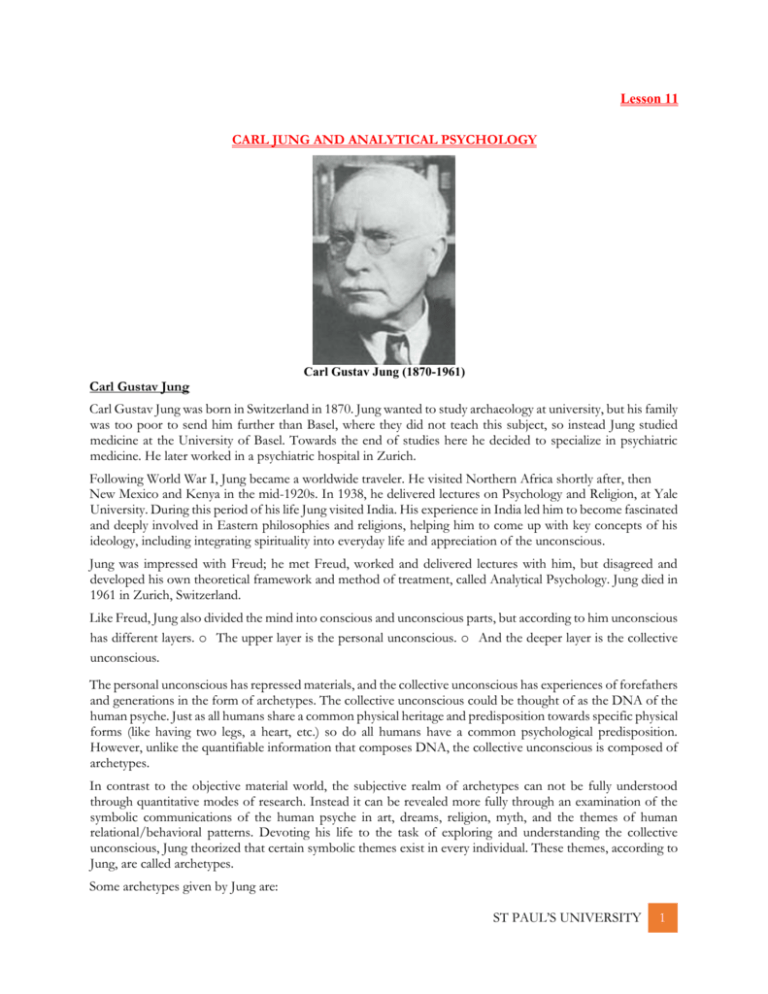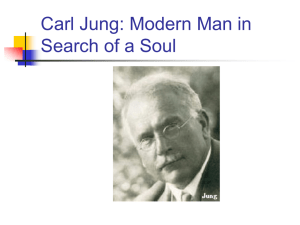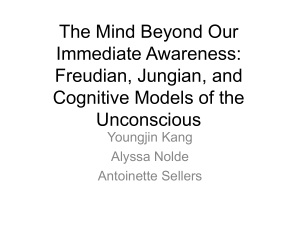Lesson 11 CARL JUNG AND ANALYTICAL PSYCHOLOGY Carl
advertisement

Lesson 11 CARL JUNG AND ANALYTICAL PSYCHOLOGY Carl Gustav Jung (1870-1961) Carl Gustav Jung Carl Gustav Jung was born in Switzerland in 1870. Jung wanted to study archaeology at university, but his family was too poor to send him further than Basel, where they did not teach this subject, so instead Jung studied medicine at the University of Basel. Towards the end of studies here he decided to specialize in psychiatric medicine. He later worked in a psychiatric hospital in Zurich. Following World War I, Jung became a worldwide traveler. He visited Northern Africa shortly after, then New Mexico and Kenya in the mid-1920s. In 1938, he delivered lectures on Psychology and Religion, at Yale University. During this period of his life Jung visited India. His experience in India led him to become fascinated and deeply involved in Eastern philosophies and religions, helping him to come up with key concepts of his ideology, including integrating spirituality into everyday life and appreciation of the unconscious. Jung was impressed with Freud; he met Freud, worked and delivered lectures with him, but disagreed and developed his own theoretical framework and method of treatment, called Analytical Psychology. Jung died in 1961 in Zurich, Switzerland. Like Freud, Jung also divided the mind into conscious and unconscious parts, but according to him unconscious has different layers. o The upper layer is the personal unconscious. o And the deeper layer is the collective unconscious. The personal unconscious has repressed materials, and the collective unconscious has experiences of forefathers and generations in the form of archetypes. The collective unconscious could be thought of as the DNA of the human psyche. Just as all humans share a common physical heritage and predisposition towards specific physical forms (like having two legs, a heart, etc.) so do all humans have a common psychological predisposition. However, unlike the quantifiable information that composes DNA, the collective unconscious is composed of archetypes. In contrast to the objective material world, the subjective realm of archetypes can not be fully understood through quantitative modes of research. Instead it can be revealed more fully through an examination of the symbolic communications of the human psyche in art, dreams, religion, myth, and the themes of human relational/behavioral patterns. Devoting his life to the task of exploring and understanding the collective unconscious, Jung theorized that certain symbolic themes exist in every individual. These themes, according to Jung, are called archetypes. Some archetypes given by Jung are: ST PAUL’S UNIVERSITY 1 o Anima (woman in man) and Animus (man in woman) o Shadow Jung identified the anima as being the unconscious feminine component of men and the animus as the unconscious masculine component in women. However, this is rarely taken as a literal definition; in modern era many Jungian practitioners believe that every person has both an anima and an animus. Jung stated that the anima and animus act as guides to the unconscious unified self. The shadow is an unconscious complex that is defined as the repressed and suppressed aspects of the conscious self. There are constructive and destructive types of shadow. On the destructive side, it often represents everything that the conscious person does not wish to acknowledge within themselves. For instance, someone who identifies as being kind has a shadow that is harsh or unkind. Conversely, an individual who is brutal has a kind shadow. The shadow of persons who are convinced that they are ugly appears to be beautiful. On the constructive side, the shadow may represent hidden positive influences. So a total personality is the result of personal unconscious and collective unconscious with the influence and impact of all the archetypes. Based upon his experiments, observations and clinical practice, he formulated his personality theory. He stated that personality has two types: o Introvert o Extrovert The extrovert orientation "finds meaning outside the self", in the surrounding world, whereas the introvert is introspective and finds it within. He also theorized that personality has four functions: o Sensory function o Thinking function o Emoting function o And intuiting function The sensory function refers to the rational part of the personality, where logic plays the dominant part. Emoting functions refers to the emotional part of the consciousness. The intuiting function refers to the ability to foresee things. Therefore, according to Jung, there are eight personality types, depending upon introversion or extroversion and the four functions of each type namely: 1) Introverted Sensory 2) Introverted Thinking 3) Introverted Emoting 4) Introverted Intuiting 5) Extroverted Sensory 6) Extroverted Thinking 7) Extroverted Emoting 8) Extroverted Intuiting These were some of the contributions of Carl Jung. JUNG’S ANALYTICAL PSYCHOLOGY ST PAUL’S UNIVERSITY 2 Carl Gustav Jung (1870-1961) Carl Gustav Jung Carl Gustav Jung developed an elaborate theory of dreams and dream interpretation. Jung proposed that the average dream is similar in structure to a drama; Jung maintained that however some dreams could be too short or fragmented to fit into this structure. Unlike Freud, Jung believed that the manifest dream (the dream as remembered) contains the actual meaning of the dream – the dream is therefore not distorted or disguised in any way. It is a message or natural expression of the unconscious. Therefore, interpretation should be based upon a series of dreams rather than a single dream. The usual practice was to interpret each dream separately, irrespective of what was in the following dream. In Jung’s view, dreams show wishes, desires, conflicts and even give warning about future. He said that a dream is difficult to interpret and understand since it is expressed in its own unique language of symbols. In order to interpret a dream, Jung used the process of amplification. In essence, amplification involves elaborating a dream image in order to determine its significance through direct and indirect association. This is achieved by gaining an insight into the dreamer's personal associations with the image (direct association), in order to discover the feelings evoked by a particular dream image or symbol. The meaning and significance of a particular word or image can vary greatly between individuals depending on the effect it has had on his/her life. The cultural significance of the image, as well as drawing parallels from the symbolism contained in folklore, history, fairytales, religion, mythology, rituals etc. As mentioned earlier, Jung believed that a series of dreams is much easier to interpret than a single dream. This is due to the fact that significant images will be repeated and the basic ideas and themes behind the dreams can be recognized more easily. A series of dreams usually indicates a complex conflict. Jungian dream interpretation also places a great deal of importance on the conscious situation of the dreamer. The dream is not an isolated event and cannot be detached from the dreamer's everyday life. Jung developed a system of psycho-therapy based upon his theory of analytical psychology. According to Jung psychotherapy is not healing but helping to develop. He rejected free association and adopted dialogue, discussion and full confession. The steps involved in Jungian therapy are: • Reading (for some) • Collaboration with the therapist • Focusing on the situation at present • Making any insight concrete and finding a way to put it into practice. ST PAUL’S UNIVERSITY 3 He also used interpretations of dreams in his method. He further took into view the positive side neurosis. Jung also stressed the importance of religion in life. He stated that to cure is to make a person symptom free, but the aim of psychotherapy is individuation. ALFRED ADLER AND INDIVIDUAL PSYCHOLOGY Alfred Adler (1870-1937) Alfred Adler Alfred Adler was born in the suburbs of Vienna, Austria, on February 7, 1870 and died in 1937. He received a medical degree from the University of Vienna in 1895. He began his medical career as an ophthalmologist, but he soon switched to general practice. He then turned to psychiatry, and in 1907 was invited to join Freud's discussion group. After writing papers on organic inferiority, which were quite compatible with Freud's views, he wrote, first, a paper concerning an aggression instinct, which Freud did not approve of, and then a paper on children's feelings of inferiority, which suggested that Freud's sexual notions be taken more metaphorically than literally. Although Freud named Adler the president of the Viennese Analytic Society and the co-editor of the organization's newsletter, but Adler didn't stop his criticism. A debate between Adler's and Freud's supporters was arranged, but it resulted in the resigning of Adler with nine other members of the organization, to form the Society for Free Psychoanalysis in 1911. This organization became The Society for Individual Psychology in the following year. He died of a heart attack on May 28, 1937. Individual psychology refers to the idea that we should see people as wholes rather than parts. The word individual means literally "un-divided." Second, instead of talking about a person's personality, with the traditional sense of internal traits, structures, dynamics, conflicts, and so on, Adler preferred to talk about lifestyle. Life style refers to how you live your life, how you handle problems and interpersonal relations. Alfred Adler postulates a single "drive" or motivating force behind all our behavior and experience. He called that motivating force “striving for perfection”. It is the desire we all have to fulfill our potentials, to come closer and closer to our ideal. It is very similar to the more popular idea of self-actualization. Further, according to Adler the concept of “organic inferiority” is one of the most important factors in human psychology. He thought that because of organic inferiority a person develops “striving for superiority.” This striving for superiority leads to: o Compensation o Over compensation ST PAUL’S UNIVERSITY 4 Compensation means striving to overcome. Since we all have problems, short-comings, inferiorities of one sort or another, Adler felt, earlier in his writings that our personalities could be accounted for by the ways in which we do -- or don't -- compensate or overcome those problems. One way to compensate inferiority feelings or complex is to become aggressive. The person develops a drive to aggression but also has social interest. As a result of compensation for inferiority, drive to aggression and social interest a person develops a style of life. A person’s mental diseases can also be understood as his style of life. Adler also stated that as a result of organic inferiority, a person develops feelings of inferiority. He may also develop inferiority complex. Adler says it's a matter of being overwhelmed by our inferiority. If you are moving along, doing well, feeling competent, you can afford to think of others. If you are not thinking of others, if life is getting the best of you, then your attentions become increasingly focused on yourself. Obviously, everyone suffers from inferiority in one form or another. For example, Adler began his theoretical work considering organic inferiority that is, the fact that each of us has weaker, as well as stronger parts of our anatomy or physiology. Adler noted that many people respond to these organic inferiorities with compensation. They make up for their deficiencies in some way: The inferior organ can be strengthened and even become stronger than it is in others; or other organs can be overdeveloped to take up the slack which is overcompensation. Sadly, there are also many people who cannot handle their difficulties, and led lives of quiet despair. If you are overwhelmed by the forces of inferiority -- whether it is your body hurting, the people around you holding you in contempt, or just the general difficulties of growing up -- you develop an inferiority complex. The Adlerian therapy consists of: • A good human relationship between patient and doctor • Direct conversation • Dream interpretation • Analysis of childhood memories • Likes and dislikes of heroes • Body of languages sitting, walking, talking etc. In other words, Adler believed in considering a number of factors when examining an individual for the disorders he or she has developed. To him these disorders may have their roots in childhood or the environment in which the person is living. ST PAUL’S UNIVERSITY 5









